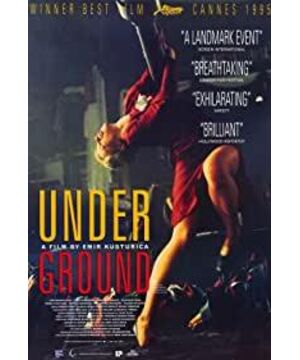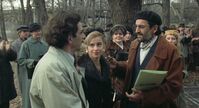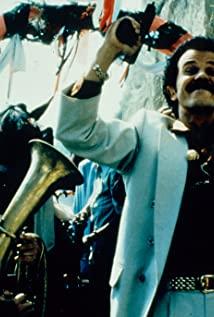Text: Savage Five
Edit: Mr.Friday
Pictures: Internet, video screenshots
Friday statement: Kusturica's name is not unfamiliar to Chinese audiences, not only because he is one of the few major directors who grew up in the former communist country (Yugoslavia), and he has frequently attended in the past ten years. In China's major film festivals, I heard that he also became an honorary professor of Chinese opera, and even brought his rock band to a concert in Shanghai! So it is not difficult to see what status this star director holds in the minds of literary youth, media people, industry colleagues and even intellectuals.
Going back to Kusturica's films, we are talking about his famous film "Underground" (1995). The film's fame at the time was not only related to its own political aura, but also to the director's maverick style and irony. The latter is often beyond the reach of dogmatic admirers. After all, this is a European-style anti-type prose film. After all, the director's feelings for Yugoslavia are wrapped in satire. Feelings are contradictory again... The combination of these contradictory things and the nearly three-hour duration makes this political film even more obscure and blurred.
(Note: This article is written based on the 170-minute Blu-ray version of "Underground"
1. Image metaphors and abstract metaphors in human settings
The character design and setting of "Underground" are non-realistic, so they have strong social labeling and symbolic meaning. Let's start with one of the male protagonists "Little Black" and the war (World War II)——
Before the war, Xiao Hei was a thief who made his fortune by stealing. Of course, you can also say that he was a local tyrant, because after he had money, he would sing and dance every day and night, seeking pleasure and squandering money. When the war came, he rose up and took up the robbery, threatening to defend his "city" and his "country", and he became a revolutionary hero.
So, what is the concept of "city" and "country" here? It seems too abstract in the eyes of some people. Therefore, the director specially concocted a beautiful and coquettish heroine, and borrowed Xiao Hei's cherished The pregnant wife's mouth said to her - "You are going to see that bitch!".
That's right, what Xiao Hei wants to defend is the coquettish lover Natasha. Coincidentally, Natasha's fate, like that of the capital Belgrade, has become the object of ravages throughout the film.
When it comes to Xiao Hei, we have to mention another actor, Ma Gao. He is Xiao Hei's closest comrade-in-arms. To what extent are they close? In our words, they went up the mountains, went down the countryside, and drifted through the chang... war. After the arrival, Ma Gao desperately rescued Xiao Hei from the clutches of the Nazis and hid him "underground". Then, Ma Gao took over Xiao Hei's revolutionary cause, rushed to the forefront of the revolution, and took on the responsibility of the intellectuals. Unifying the propaganda work, carrying the burden of heroes, and even meeting and assisting the great leader Tito,
Of course, he even inherited Xiao Hei's lover Natasha. I wonder if this reflects the concept of communism. Just kidding, keep watching. As mentioned earlier, Xiao Hei had a pregnant wife. She hid in the ground when the war came. She gave birth to Ma Gao's son Jovan and died. It is no exaggeration to say that this child is the second generation of Lie. This Jovan had been in the ground for decades, and even the wedding was held underground, so he looked dull and naive, so much so that when he returned to the ground, he couldn't even tell the difference between the sun and the moon.
By the way, Xiao Hei also has an animal breeder's younger brother named Ivan. He is a stammer and has difficulty expressing himself. He can only cry and even hang himself in the event of a disaster.
During the Ivan War, I hid underground with everyone, and stayed there for decades. When I went out again, my former city and home were gone, and the ending could be imagined.
Finally, look at the band that followed Xiao Hei,
You can say that they are art workers or working bands, in short, where are the heroes.
We'll talk more about the band later.
Okay, listing the characters in these movies, have you seen the director's set-up routine? This is like the layout of a chess game before the game, each piece, each landing position, has its purpose and symbolism.
So, after the layout is over, is there going to be a wonderful fight or even an epic tragic story? It doesn't seem to be, on the contrary, the director let them play a house, and this play is a few hours long! (Note: Director's Cut is 320 minutes)
2. "Pediatric" farce between characters
Usually, an epic-level movie (or a movie that spans time and has a longer period of time) is relatively serious, and it will cover the thematic elements of the changes of the times, the joys and sorrows, and the difference between things and people.
"Underground" naturally has all these things, but the question is, what did its characters do under these thematic elements?
In a word: it's bullshit!
Everyone has noticed that this nonsense is not an interpretation of the subjective literary style of the film, but a manifestation of the style of the film. In other words, the director used the material of war, turmoil, rescue, coup d'etat, life and death in the background of the story, but he used comedy, absurd drama, nonsense and even comic sketches in the expression, so that we are in the Watching the entire film, it feels like a gang of neurotics is doing a paediatric farce.
It reminds me of Fellini's film style. It's true that Kusturica's film is in many ways similar to Fellini's (especially in the sense of being wild and nonsensical), but "Underground" is not quite like a comedy, after all, he is taking human life, politics and National enemies hate to joke, thinking of this, I can't help but feel a sense of seriousness and suffocation - not so much a farce, but a suicide carnival before the disaster. In the popular phrase, it is called "you die if you get too addicted".
We assume that the "suicide carnival" is the main body of this movie, then, naturally, all plot settings, character settings and even atmosphere will have to focus on this main body. In other words, those settings were to fan the flames and act as catalysts for this suicide spree.
When it comes to catalysis, the first thing that comes to mind is the band and the music they play.
3. The band promotes farce and achieves suicidal madness
In the film's story, the band plays music almost non-stop, which also serves as the film's soundtrack. As the soundtrack of a movie, it seems to be mechanized, monolithic, and rooted to the end (it is not as fast and slow as traditional movie soundtracks, intertwined with joys and sorrows, and full of drama),
As a character in the story or a state in the context of a specific era, this crazy "carnival music" just reflects the crazy heart of the characters.
Let's look at the performers, let's call them "artists". This group of artists is very strange, there is such a scene in the movie, it is a scene in the underground wedding carnival feast - the monkey enters the tank, is seen by the musicians, he mutters to himself anxiously: the monkey enters the tank , the catastrophe is imminent!
It is interesting to savour the play carefully:
First of all, these artists are not blind, they can see the problem at a glance;
Secondly, their reaction after seeing the problem was just talking to themselves, that's all, and then they continued to choose to have fun with those people until the tragedy happened.
You can interpret their behavior as silent self-preservation, or as powerless. In short, this is the artist's status quo that the director wants to express in the film.
Anyone who has seen the movie after that knows what happened - the "underground society" was bombed by monkeys, and everyone was forced to return to the ground (reality).
4. The magic realism romance hidden in the farce
If the things that happened in the underground and the war in the first two hours of the movie were absurd satires, then, going back to the ground again, there is no doubt that the director added a layer of "romance" to those absurd satires.
This romance is concentrated in the fathers of Jovan and Ivan the stuttering - times have changed, but the fathers are still fighting for the motherland. The city is long gone, but Ivan is still struggling to find it.
And when these characters died one by one, the movie did not render the tragic color, but continued to strengthen the "romance" to achieve an almost magical result——
The crowd gathered and the carnival remained the same. It was simply a religious carnival.
5. The creator's political logic
For many years, I have been thinking about a question: what kind of cultural heritage and life experience can make Kusturica make a film of diverse and mixed styles like "Underground". Obviously, Poland can't do it, Cuba can't do it, let alone Russia. But we can never deny the role of the social background in this film. After all, that Yugoslavia has existed for half a century, after all, it is the land that nourishes the director.
Where is the director's logic? As an artist, what makes him able to endow the film with elements of tragedy, optimism, banter, and romance at the same time... This is a question worthy of our consideration.
Finally, I recommend the book "Tito: The Inside Story", maybe it can help you better understand the film and the former Yugoslavia.
▼▼▼ Previous related articles, you may like:
10 movies with a political vibe hidden in the story
Recommended | Top 10 alternative comedies, take you to explore the N possibilities of laughing to death
"Recommended" 10 Weird War Satires
Fellini's film navigation and director
View more about Underground reviews










